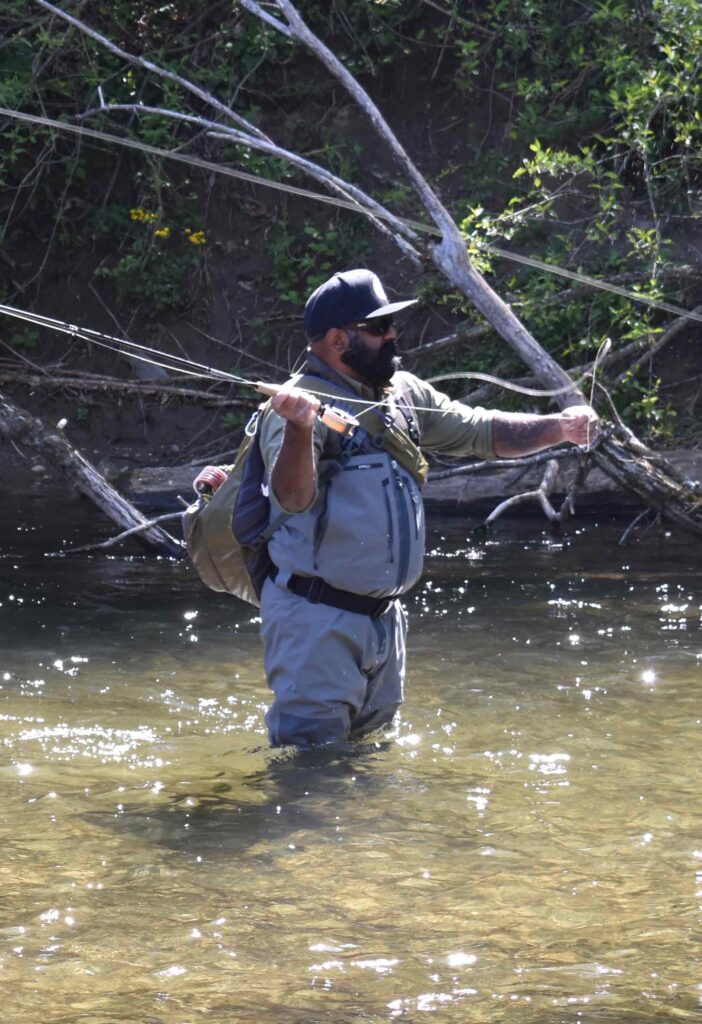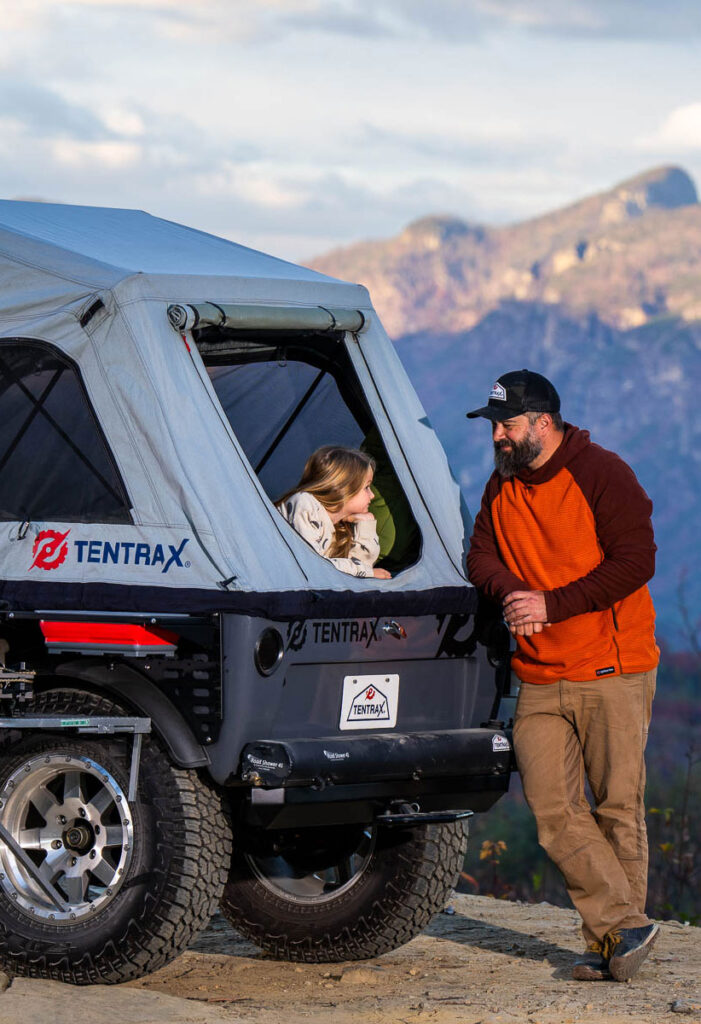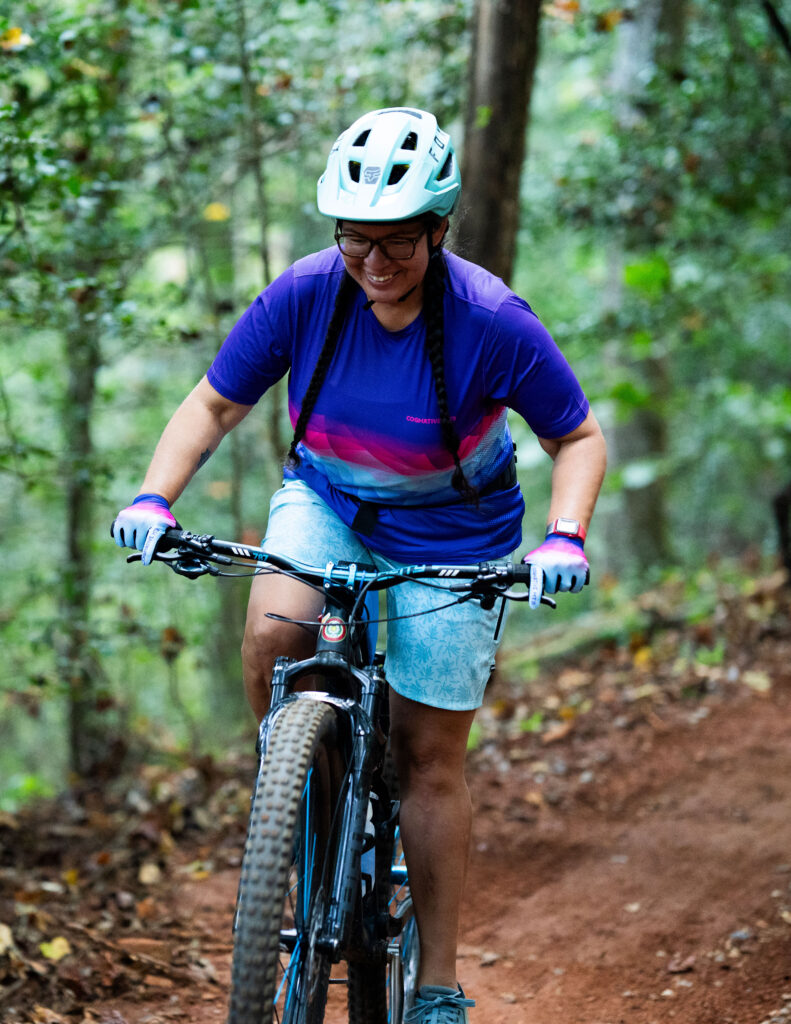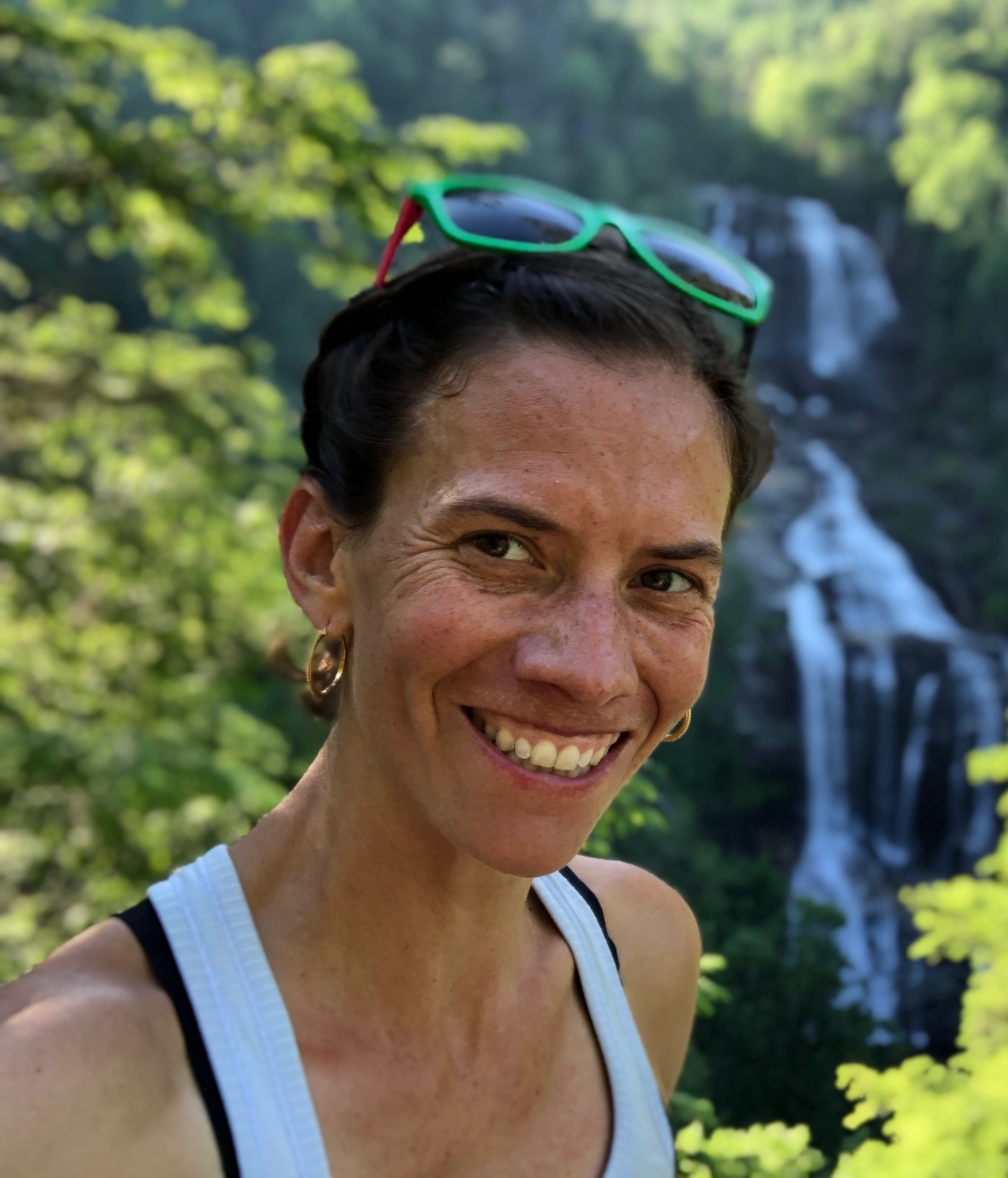
MADE BY MOUNTAINS STORY
Jennifer Pharr Davis
I’ve hiked the Appalachian Trail three times. The second time I was going for the women’s record, which had really not been established. It was partly a passion project to see what I was capable of.
Jennifer Pharr Davis will be the first to say she owes a lot to the trail. Her legendary treks have encouraged her to push her own boundaries, like when she set the record for the fastest Appalachian Trail hike by a woman in 2008 and returned three years later to break the overall record for women and men. It’s along trails she’s learned to quiet down and connect deeply with the land. Ultimately, trails have taken Pharr Davis on a rich journey of self-discovery—and prompted her to chart her own life path along the way.
Jennifer Pharr Davis is an internationally recognized adventurer, speaker, author and the owner of
Blue Ridge Hiking Company
Inspired and empowered by her experiences on the trail, she decided it would be her mission to help others along a similar journey. She founded Blue Ridge Hiking Company, an inclusivity-minded guide service for day hikes and backpacking trips, in Asheville, North Carolina—not far from her hometown of Hendersonville—to do just that. Fueled by the mantra that the trail is there for everyone at every phase of life, she and her crew connect newcomers and experienced hikers alike to the transformative power of the outdoors.
Hiking changed my values. It broke a lot of my preconceived notions about who I was, and what my options were in the world. I think we all grow up as a product of our societies. Going on the trail and learning who I was through the lens of nature—and in a community that’s very different—is an experience where you feel vulnerable in a positive way. You have to trust other people, and you learn to communicate with people who are very different from you. I think it’s empowering because it’s extremely challenging. You learn that you can do more and that you have interests and abilities you didn’t recognize beforehand. There’s a hiker’s saying that goes, “The trail gives you what you need.” I’ve experienced that and observed that for so many individuals.
Hiking can be a powerful catalyst for positive things. I decided I wanted to do it more, and help others do it as well. So when it became clear that I wanted to start a hiking company—because helping other people get outdoors was all that I would think about—I knew I wanted to move back to Asheville. I wanted to share with people the mountains I loved growing up. And it’s funny because I didn’t grow up with the outdoors so much. It wasn’t like my family camped together or backpacked together. But even so, growing up here a lot of my early memories are tied to the outdoors. Picking blackberries from a wild blackberry patch and seeing bear fur in the briars. Being on the deck at my childhood home and seeing this weird loopy thing sticking up through the deck and it was a snake! Being young and playing in creeks with my brothers and looking for crawdads. I think these mountains just become a part of who you are.
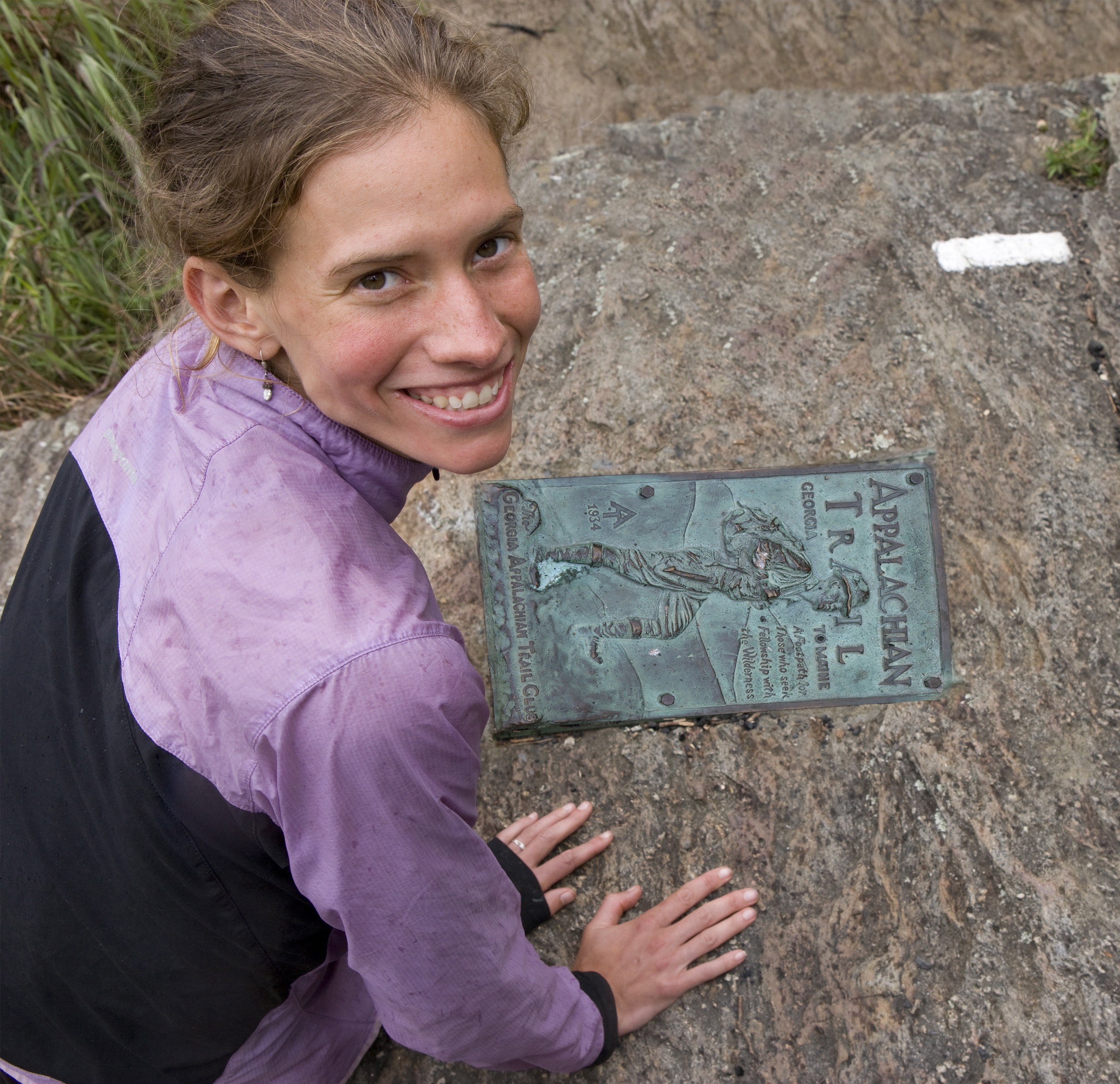
Equality on the Trail
I’ve hiked the Appalachian Trail three times. The second time I was going for the women’s record, which had really not been established. It was partly a passion project to see what I was capable of. But also very circumstantially, I had my company and I had also gotten married, and didn’t have time to do the whole trail in the traditional way. I didn’t have time to devote six months to the trail. But I thought, “I could do it in two months.” That was the way I could make it happen.
That second hike was supposed to be the last time. I would set the record, and then I was going to settle down even more after that. But what happened was, I realized I didn’t think there should be a “men’s record” and a “women’s record.” I felt like I had limited myself in that sense. Mentally, I had assumed that I would be slower than the guys, because I had grown up playing traditional sports, right? And there are always different categories, and guys are faster and stronger.
A big part of the trail for me has always been breaking out of those societal molds and expectations. So I had this sense of frustration: “Dang it. I did it to myself again. I told myself that I was less-than and limited myself because of perception—and not reality.” It became clear on that second hike that I felt like I could compete with the guys. And so I went home, and I tried to get it out of my head for three years. But it didn’t work. My husband and I knew we wanted a family, and I knew at that point my time and body would no longer be my own in the same way. And so I said, “Okay, one more time!” My husband signed on and we went back for the third hike in 2011. And that’s when we set the overall record on the trail.
“The Trail is there for Everyone”
Things have gotten so much better now. But sixteen years ago when I got started, I felt like all the gear, all the information was heavily geared toward guys. It was harder for me to find quality gear; it was harder for me to find stories of young women who had solo hiked the trail. And I think that has definitely changed, but still today you see that there are individuals and communities who don’t haThings have gotten so much better now. But sixteen years ago when I got started, I felt like all the gear, all the information was heavily geared toward guys. It was harder for me to find quality gear; it was harder for me to find stories of young women who had solo hiked the trail. And I think that has definitely changed, but still today you see that there are individuals and communities who don’t have the same resources when it comes to getting outdoors. Or that hasn’t been part of their culture, upbringing, or experience. But we believe the trail is there for everyone at every phase of life.
There are several barriers that keep people from going outdoors. One is inexperience, one is gear, one is guilt (a lot of times, for women), one is fear. So many people come to us and say “We’ve never been hiking before.” People are afraid they aren’t in shape and can’t go far. We have the ability to say, “The trail doesn’t care how far you go or fast you go. And as your guides, we certainly do not care either. We’re here to support you and your experience and your connection to the outdoors.” And it’s not about numbers we’re coming away with, like miles per hour or how far we went. Customizing the trips so they suit people’s needs and they have a positive experience with the outdoors is really big for us. Our focus isn’t to push you past your emotional and physical boundaries. Our focus is to give you a positive connection with the outdoors.
There are several barriers that keep people from going outdoors. One is inexperience, one is gear, one is guilt (a lot of times, for women), one is fear. So many people come to us and say “We’ve never been hiking before.” People are afraid they aren’t in shape and can’t go far. We have the ability to say, “The trail doesn’t care how far you go or fast you go. And as your guides, we certainly do not care either. We’re here to support you and your experience and your connection to the outdoors.”
The Allure of the Mountains
The mountains feel like a grandmother or great grandmother to me. They feel very wise, very maternal, very nurturing. I’ve hiked all over—in all 50 states, on 6 continents. And I have seen some jaw-dropping extreme beauty. But it feels more approachable here. And there is also a wealth of knowledge—you’re never going to know all the secrets of the land. The biodiversity is almost overwhelming, how many different plant species or mushrooms or salamanders you can find in these mountains! It becomes this amazing treasure hunt, and every season is different. And they’re so old; that’s part of it. They’re 480 million years old. That’s part of what gives them that feeling of wisdom.
But they’re so full of life, too. That’s the other thing. A lot of places I hike, the environment is more severe. It’s more arid, or it’s colder. Here, we have water. And we take it for granted! There are so many beautiful streams and rivers, and it rains and rains. It’s so lush and verdant. I think it supports life and creativity and is why the mountains also feel very intimate to me. Because so many of the qualities I love are found in the details. You have to go out into it to get to know it. The views are great, but I think Western North Carolina is best experienced inside the forest.
Having traveled pretty extensively, it’s always this wonderful feeling to come back home and think, “There’s no place I’d rather live.” And, quite frankly, I love Asheville. But my favorite thing about living in Asheville is an hour in every direction. It’s just so great to be able to go to Madison County, go to Hot Springs, hit the Appalachian Trail, be able to go to the Smokies, go to Cherokee or Oconaluftee. To go to Linville Gorge, or head down to the Blue Ridge escarpment and see waterfalls. An hour in every direction is just so great. I love that about Western North Carolina.
